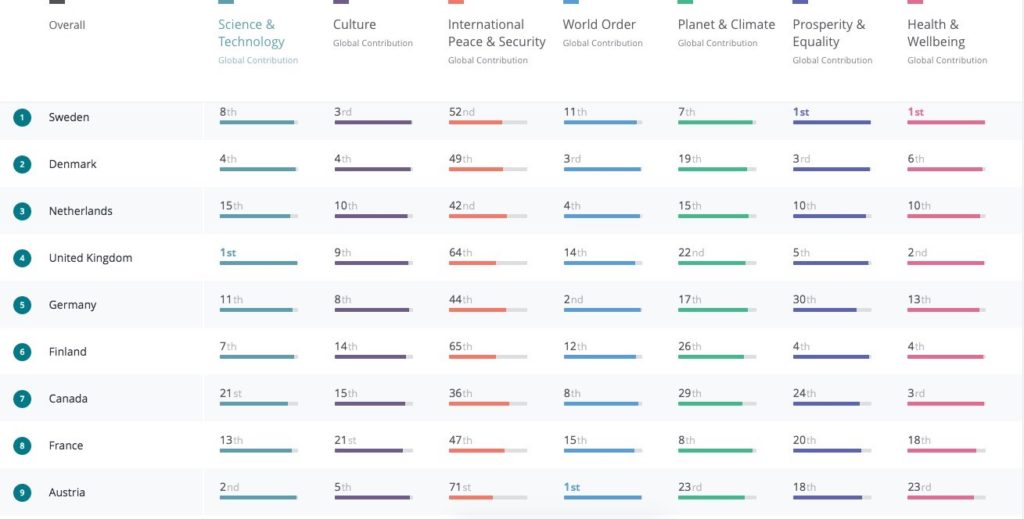Sweden tops Good Country Index: a radical study that measures the contribution nations make to humanity as a whole.

Countries should no longer be judged purely on the progress or prosperity of their own citizens, but also on the impact they have on the rest of humanity and the rest of the planet. That’s why Simon Anholt created the Good Country Index: the first and only survey that, instead of measuring country performance in isolation, measures what each country on earth contributes to the common good of humanity, and what it takes away.

Sweden has taken pole position in the Good County Index, outranking 162 other countries in a league table based on 35 separate indicators from sources including the United Nations, the World Bank and other international organisations. This makes Sweden, Anholt says: “the ‘goodest’ country on earth, relative to the size of its economy”. Despite the addition of 38 countries since the first edition of the index, Libya has once again ranked last.
The only study of its kind, the Good County Index is the brainchild of Simon Anholt, an Independent Advisor who has worked with the Heads of State and Governments of more that fifty countries. His aim is:
“to find ways of encouraging countries to collaborate and co-operate a lot more, and compete a bit less.”
Through the Index, Simon aims to further this goal by stimulating a global discussion on how countries can balance duty to their populace with responsibility to the wider world. He argues this is essential for the future of humanity and the health of the planet, and with the Brexit vote soon, his timing couldn’t be more fortuitous.
From our partners:
The global impact of each country is measured across seven categories, with five individual indicators in each category (the full data for both editions of the Index is available at www.good.country).
Explaining the Index, Anholt says “A Good Country is one that successfully contributes to the good of humanity. Of course it must serve the interests of its won people, but never at the expense of other populations or their natural resources: this is the new law of human survival, and it’s a balance which is far more easily maintained than many people imagine.
“Working together makes for better policy than working alone.”
“This upgraded and updated edition of the Index puts Sweden in first place because, relative to the size of its economy, it simply does more ‘good’ and less harm that any other country on earth. However it’s important to note that the performance of smaller countries in the Index tends to be more volatile: this is unavoidable as events naturally make bigger difference to smaller countries. This partly explains why Ireland, Kenya, Iceland and Costa Rica have experienced significant drops in ranking.”
“Most of our problems are rapidly and dangerously multiplying because of globalisation. We need our governments to understand that they’re not just responsible for their own voters and taxpayers, but for every living thing on the planet. They must collaborate and cooperate more, not less; the UK, for example, isn’t just an island unconnected to the rest of Europe or to the rest of the world. Just like every other country on earth, it is part of one system. If it fails, we all fail.”
Biographical Note:
Simon Anholt is the founder of Good Country and the Good Country Index, the world’s first study of how much each country on earth contributes to the rest of humanity and to the planet.
Through his work as an independent advisor to Head’s of State and Head’s of Government, Simon has developed innovative strategies, policies and projects for more than 50 countries, enabling them to engage more positively and productively with other countries.
His work covers areas as important to business leaders and global publics as much as to governments, such as international and cultural relations; trade, tourism and foreign investment; sustainable progress; national identity and reputation.
He is a member of the organising committee of the Anglo-Dutch Apeldoorn Conference and was appointed Honorary Professor of Political Science at the University of East Anglia in 2013. He was Vice-Chair of the UK Foreign Office’s Public Diplomacy Board, and he is the author of five books.
Follow Simon Anholt on twitter: @simonanholt














